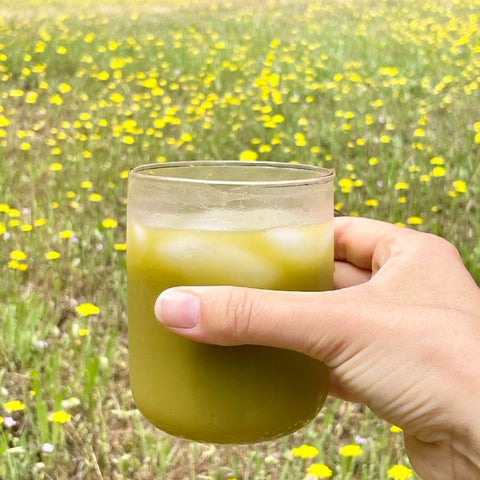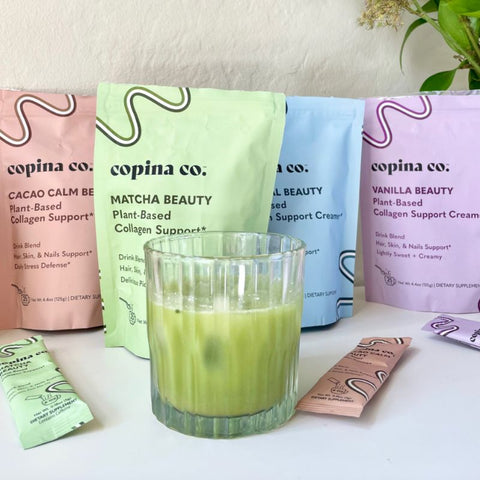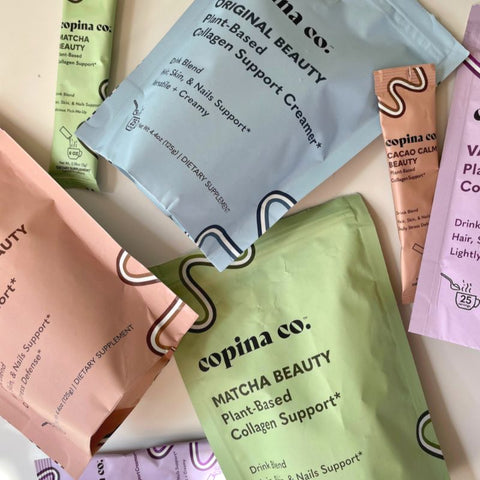The end of summer often means getting back into a routine, whether it is heading back to school or your 9-5 without summer Fridays. If you are getting anxious about summer ending and do not know how to build a more solidified routine, here are five tips to help create better wellness at work or school.
1. Limit Caffeine
We all love our morning burst of caffeine to get started with our day. But, consuming too much caffeine or caffeine on an empty stomach can actually affect our stress levels, sleep, and hormones. The reason behind this is that stress and caffeine both play a role in our cortisol levels. The USDA’s Dietary Guidelines for Americans recommend consuming no more than 400 milligrams of caffeine per day.
Now, let’s talk about how matcha caffeine content compares to coffee’s caffeine content. Generally speaking, matcha contains less caffeine than coffee. But again, the exact difference will vary. According to the U.S. National Library of Medicine, an 8-ounce cup of coffee can have 200 milligrams of caffeine. One teaspoon of matcha, on the other hand, has only roughly 70mg of caffeine
The reason people rave about matcha (besides the delicious taste and lovely color) is that it gives you sustained energy without the jitters and crashes that you get from coffee’s caffeine. The reason is that matcha boasts a magical amino acid called l-theanine, which provides a calming effect and slows down the body’s caffeine absorption.
When you drink matcha instead of coffee, you also get many other added benefits, with antioxidants being at the top of the list. Like green tea, matcha is rich in antioxidants, and because you consume the tea leaves, you get even more antioxidants. Antioxidants are known to protect against heart disease and cancer, regulate blood sugar, reduce blood pressure. Consider matcha if you still want some caffeine but are finding that coffee or your energy drinks are leaving you jittery and anxious.
Give Copina Co.’s Matcha Plant-Based Collagen Boost Drink Blend if you want the power of plants and caffeine in your new caffeine fix.
2. Be Patient and Plan Ahead
Getting into a new routine takes time. Similarly, establishing habits within this routine might take longer than they do in an older routine. Try establishing the routine you want slowly in order for your body and mind to adjust.
For example, if you are starting a new master’s program or at a new job and want to incorporate working out after work or school, start small. Your body has to adjust to the new workloads and your mind power new places and experiences to use up. Start by working out for thirty minutes and slowly increase when your body feels ready. This way you will not burn out from working out for an hour on top of a stressful day, but still, get the benefits of a healthy lifestyle.
3. Sleep Hygiene + Schedules
For many people, getting on a sleep schedule that helps promote a full night’s rest is not easy. If you are new to getting into a sleep schedule, which is important to combat stress and burnout, you’ll also need to be thinking about your sleep hygiene.
If you are completely new to a sleep schedule, try going to bed and waking up at the same time every day for two weeks prior to when you start a new schedule. This helps your body adjust and allows it to naturally be in tune with your body’s inner clock. Try using the clock app on your phone to remind you thirty minutes before your goal sleep time so you can start winding down.
A great way to create a nightly ritual that helps your body calm down before bed is by making a cup of our Cacao Calm that has ashwagandha. Ashwagandha has long been prized for its ability to help fight stress and ease anxiety, naturally. This adaptogen works to promote a sense of calm by blocking stress-receiving pathways in the brain. It has also been shown to help minimize the release of cortisol (a.k.a the stress hormone). Ashwagandha naturally contains withanoside compounds, which can change how your body responds to stress and increase your overall resilience towards feelings of stress and anxiety.
Other ways to practice sleep hygiene:
- View sunlight by going outside within 30-60 minutes of waking
- Stray away from late-in-the-day caffeine
- No bright lights before bed or in bed
- Write out your to-do list for tomorrow before bed so you get it off your mind
4. Rank Task Lists
We all want to be the person that can handle anything and everything that gets thrown our way. Truth is, our brains cannot shift between too many things and still function at our highest potential. If you find your daily task lists to be long, try ranking them into a few categories:
- Priorities
- 2nd-level Priorities
- If I can get to them
This will help you be able to accomplish more and use the most brain power for your priorities instead of shifting between the levels and burning out before what you truly needed to be done.
Doing this before you go to sleep helps remind you to set an intention or purpose for the next day which helps keep you motivated. Seeing what you have accomplished at the end of the day is also a great way to show the promises you made for yourself and help build out your self-confidence at work or school.
5. Find Things to Look Forward to
Lastly, make sure you are implementing time to be a well-rounded human being. This looks different for everyone but making sure you add things into your daily or weekly life that help you find joy and excitement is helpful when dealing with stress.
Find time to hang out with friends or family, try new things, or treat yourself (this can be monetarily or non-monetarily). If you can combine one or all of the above it is a great way to make sure you are finding time for experiences outside of work.
If you want to dive deeper into stress or burnout, here are some podcasts that dive more into helping yourself with advice from doctors:
- Master Stress: Tools for Managing Stress & Anxiety by the Huberman Lab
- How to Manage Your Stress and Prevent Burnout with Dr. Emily Nagoski by Call Her Daddy
Stress at work and in life is inevitable, but there are things we and our support system can do in order to make it not burn us out over time. A state of wellness is a collective resource of all our actions. By creating actionable things you can do in your routine or once a month, you are actively adding to your collective resources.
If using Copina Co. Cacao Calm every night is a part of that collective resource, we would love to see it! Send us a photo or a video on our Instagram or Tik Tok so we can see how Copina Co. is a part of your daily life.
If you want to continue on a wellness journey, try reading some of our other blogs geared toward helping set you up for success:













